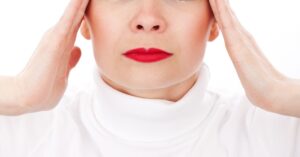

Source: G-stock Studio/ Shutterstock
Do you suffer from headaches? Chances are pretty good that you do since more than half of adults get headaches at least once a year, and many get them much more frequently.
Headaches are sometimes a sign of something sinister. But most of the time they are caused by something we are unintentionally doing to ourselves, which gives us some control in preventing them. And, no, it’s not (usually) from discussing current events.
Headaches are a very diverse group of conditions, but by far, the two most common types of headaches are migraines and tension headaches, so we’ll focus on these.
A migraine is a moderate-to-severe intensity headache that is typically slow-onset (over 2-4 hours), one-sided, and pulsating. It is often associated with nausea and/or visual changes (“auras”) and lasts anywhere from four hours to three days. It is more common in women and usually begins between 20-50 years old. About a third of all adults get migraines.
Alternatively, a tension headache is a mild-to-moderate severity headache that is described as a “band” or tightness around the head. It can radiate into or from the neck. Tension headaches are more likely due to muscular problems in the head and neck, though many people feel stress plays a large role.
If you suffer from either of these or other types of headaches, know that there are likely actions you can take that may minimize or even eliminate your misery:
- Poor sleep is a major contributor to headaches. Headaches are 4-8 times more common in people with sleep disorders since the same region of the brain is responsible for both. If you get fewer than seven hours of sleep per night and suffer from headaches, you should do your best to improve your sleep habits. If you snore and wake up with headaches often, you should see your doctor and consider getting evaluated for sleep apnea.
- It may not come as a surprise that what you eat or drink can trigger headaches as well. Most anyone who went away for college knows that alcohol can cause headaches, but you may not know that it doesn’t take much. A single drink may be enough for some people to trigger a migraine.
- Another common trigger is caffeine, which can both cause and treat a headache. You should try to be consistent with your caffeine intake because either an increase or decrease in intake can trigger a migraine. If you have seven grande-blonde double-shot Americanos a day, that may be OK, in terms of headaches at least, as long as you keep having seven every day. Some other less obvious but common triggers include aged cheeses, chocolate, smoked fish, artificial sweeteners, and preservatives such as nitrates and MSG.
- Now, if you’re thinking, “The cure sounds worse than the disease,” remember that these foods and drinks do not cause symptoms in every headache sufferer. Each individual has their own triggers, and usually, these are pretty consistent. The best way to find out your triggers is to keep a headache journal. Write down what happened in the 12-24 hours prior to each headache, then look for patterns. This should include things such as stress, weather changes, and menstruation, which you may not have any control over, but are also important factors in causing your misery.
- The last important point to remember is that pain medications can cause migraines if you use them too frequently. This applies to any headache medication, whether it’s prescribed or over-the-counter, including Advil, Aleve, aspirin, and Tylenol. If you use a headache medication more than twice a week, you might be having withdrawal headaches, which can be worse than the original reason you started the medication. So be cautious about taking pain medications too frequently. Alternating classes of medications, such as taking Acetaminophen and Advil on alternating days, can limit withdrawal headaches.
- Finally, if you have any concerning symptoms, such as fever, weakness, numbness, vision loss, neck stiffness, or recent head trauma, you should see a physician right away.
As is so often true, eating right, getting enough sleep, and avoiding bad habits such as excess alcohol and caffeine result in better living. When we treat our bodies right, they treat us right.






